- November 4, 2023
Bengal vs. Toyger: The Main Differences (With Pictures)
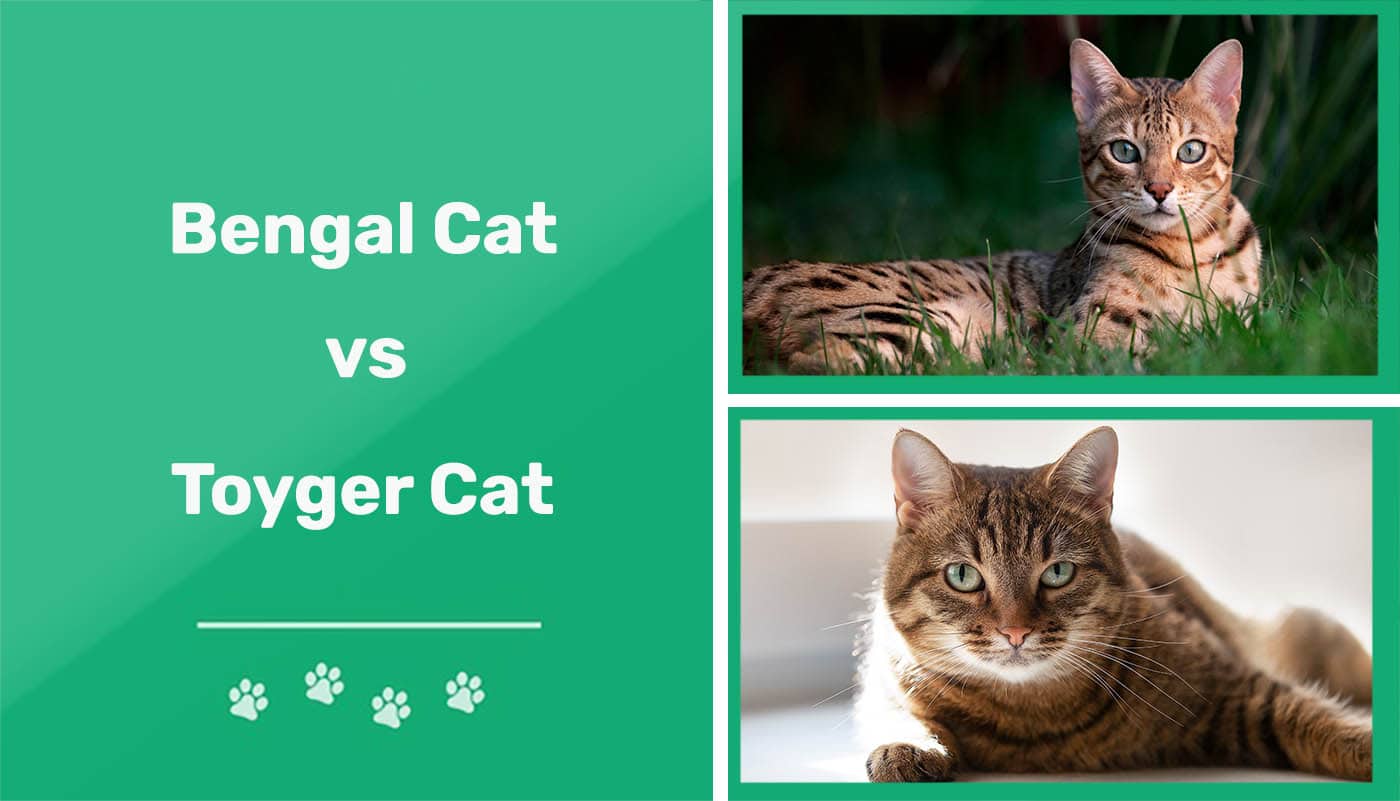
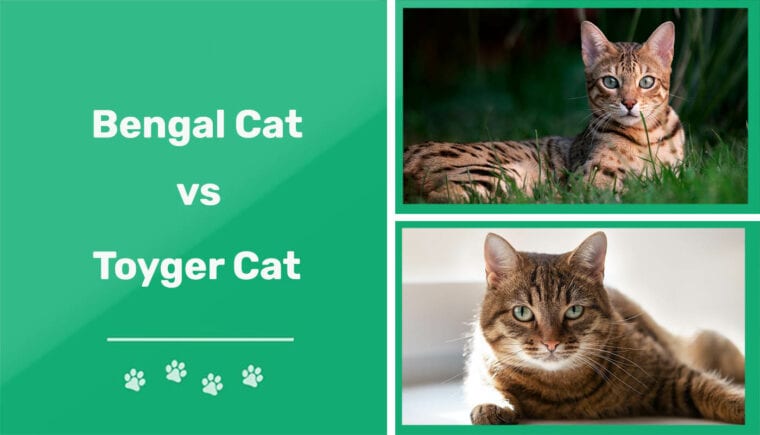
What’s the difference between the Bengal and the Toyger cat? A better question is: do you want an Asian Leopard Cat or a toy tiger?
The Bengal and Toyger are very similar regarding appearance and genetics, with the most notable difference being personality. In this post, we break down the similarities and differences so you can choose the right pet for your home.

Visual Differences

At a Glance
Bengal
- Average height (adult): 13–16 inches
- Average weight (adult): 8–15 pounds
- Lifespan: 12–16 years
- Exercise: 30 minutes or more daily
- Grooming needs: Moderate
- Family-friendly: yes
- Other pet-friendly: Sometimes
- Trainability: Difficult
Toyger
- Average height (adult): 9–13 inches
- Average weight (adult): 7–15 pounds
- Lifespan: 10–15 years
- Exercise: Seldom
- Grooming needs: Moderate
- Family-friendly: Yes
- Other pet-friendly: Yes
- Trainability: Moderate

Bengal Overview

The Bengal is a hybrid breed between a domestic cat and the wild Asian Leopard Cat (Prionailurus bengalensis). The Asian Leopard Cat is about the same size as a domestic cat but has gorgeous leopard-like markings, making it a prime target for poachers.
Over the years, Asian Leopard Cats quickly moved up on the endangered list, sparking a fire in cat breeder and conservationist Jean Mill.
Mill wanted a domestic cat species with an exotic appearance to deter wealthy women from purchasing the Asian Leopard Cat’s furs, reducing the demand for poached furs in general.
In 1963, Mill began tinkering with the Asian Leopard Cat and domestic cat genetics. The result was a small cat with exotic features but the temperament of a domesticated cat.
Personality & Character
Owning a Bengal is like owning a house leopard. These cats are independent, highly energetic, and in tune with their wild ancestors’ desire to explore and play. They require exercise and mental stimulation far beyond the typical house cat. However, because they’re a unique breed, they’re at risk of being stolen if outside unsupervised.
You can prevent behavior problems with proper exercise and mental stimulation, such as cat trees, mind games, toys, and frequent walks. Even so, Bengals are known to have “odd” cat habits, like stealing objects and hiding them around the house, or playing in the kitchen sink. Bengals will even play fetch when given the opportunity!
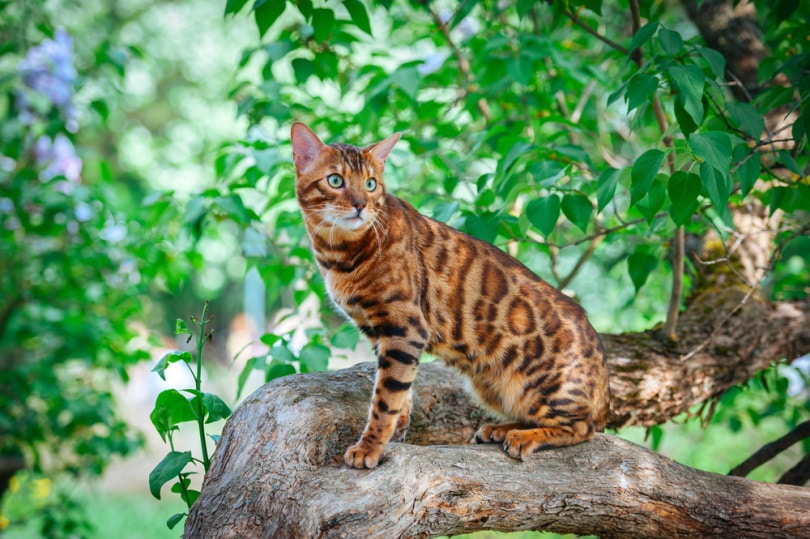
Grooming & Appearance
Bengal cats are medium-sized cats with small, round heads and large eyes, but their most notable features are their markings. They have facial markings similar to tabby cats and leopard-like spots or rosettes. Their fur and markings come in various colors, with rust and black being the most common.
In addition, Bengals have long back legs compared to their front legs. This allows them to have a longer, more powerful stride.
Suitable For:
Bengals need an experienced cat owner who is physically active and can meet their exercise requirements. They do best in homes without small children and other pets but can learn to tolerate them.

Toyger Overview
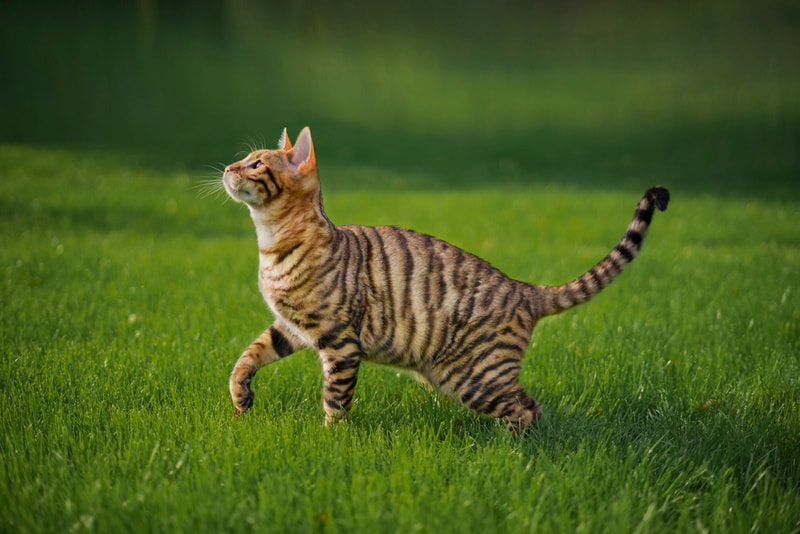
The Toyger is one of the newest cat breeds to date. In fact, the Toyger didn’t earn eligibility for cat shows until 2007, when the International Cat Association officially listed it as a championship breed.
During the 1980s, when Jean Mill was breeding Bengal Cats, her daughter Judy Sugden worked on her own project.
Like her mother, Sugden owned a Bengal and one day noticed spots on the Bengal’s forehead where the tabby “M” should be. Sugden used the opportunity and began breeding her Bengal with a tabby to create a domestic cat with a tiger-like appearance.
Personality & Character
The name “Toyger” blends the words “toy” and “tiger,” but don’t be fooled by this name. Unlike Bengals, Toyger cats are more easy going since their genetics are further removed from their wild ancestors.
Still, Toygers are vocal, lively kitties who enjoy playtime and snuggles. Their calm demeanor makes them an ideal choice for families with children and pets compared to the Bengal. Toygers are still highly active and become bored easily, so offer plenty of enrichment and mental stimulation for a pleasant, loving cat.
Health
Toygers have no major health conditions but can be susceptible to heart murmurs. Other medical conditions like obesity and dental disease become issues if adequate exercise is absent or the condition is left unmonitored.
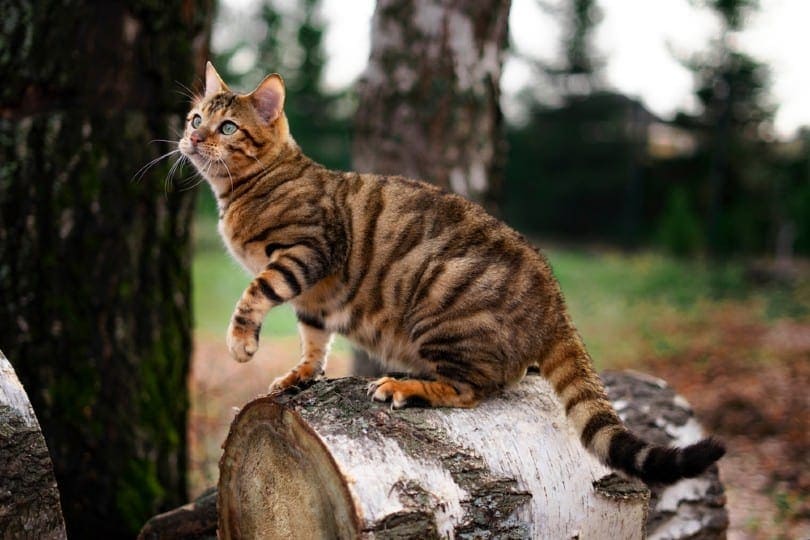
Grooming & Appearance
Toyger Cats are medium-sized cats with short hair and bright orange fur. The underbelly appears to be a softer white color. Across the back are black and brown tiger stripes with a slight shine. Interestingly, each cat’s fur pattern is uniquely different from one another.
Toyger Cats have circular markings on their face with a head shape described as “half-hexagon.” These cats are lean and muscular with long bodies (although not as long as Bengals). The ears are round and small.
Suitable For:
Toygers are suitable for active, present families with children and pets.

Which Breed Is Right for You?
The Bengal and Toyger Cats are very similar in appearance and genetics, but they have small differences that make a big difference overall. Ultimately, it depends on your lifestyle.
Bengal Cats are more closely related to the Asian Leopard Cat, so their personality is very inquisitive and wild. They can do well with pets and children but do best in homes where they have the owner all to themselves.
On the other hand, Toyger Cats are more welcoming of small children and pets. They’re equally inquisitive and energetic but are more willing to relax and snuggle.
The choice is up to you. Which of these cats do you think would do best in your home now?
Featured Image Credit: (T) TheCats, Shutterstock | (B) Anna Korovina, Shutterstock
Tags
What do you think?
Related Articles

New Puppy Checklist: Gear You’ll Need for Your New Dog
Getting a new puppy is really exciting, but before you welcome them home, it’s important to prepare your space for them. Since puppies need a

How Big Do Mini Poodles Get? Vet Reviewed Average Weight & Growth Chart – Dogster
The information is current and up-to-date in accordance with the latest veterinarian research. Learn more » When you buy a Miniature Poodle, you might not

Can Police Dogs Smell Nicotine? Vet Verified Facts & Info – Dogster
The information is current and up-to-date in accordance with the latest veterinarian research. Learn more » While cigarette sales have been declining steadily for decades,

How Old Is 5 in Dog Years? Vet-Approved Guide to Each Size of Dog – Dogster
The information is current and up-to-date in accordance with the latest veterinarian research. Learn more » A common method for calculating a dog’s age is

